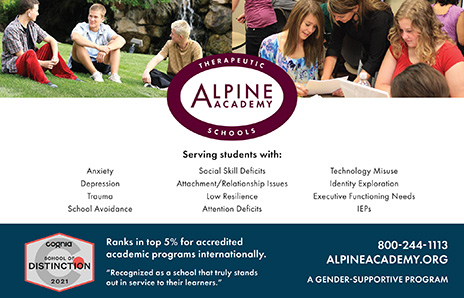What You Need to Know: Returning to U.S. Public Schools with Special Education Needs
Are you returning to the U.S. with a child who has an IEP or 504 Plan? GCLO can help you navigate—and advocate—for the best outcome.
BY CHARLOTTE LARSEN AND REBECCA MCPHERSON
Returning to the U.S. after being overseas with a child who has an Individualized Education Program (IEP) or a 504 Plan can be a challenge. Finding the right services and schools to meet the needs of your child will take time to research and understand. As every child is different, many factors will go into this decision process. It is important to research the school districts and programs you are considering and evaluate whether the education they have received overseas will align with the different types of public school systems in the U.S. Starting early, asking questions, and connecting with the right resources will be crucial to making the transition easier.
As a Foreign Service parent, you may face the reality that the IEP or 504 Plan from your children’s international school is no longer valid once they come home, nor is any educational assessment completed by an outside provider. If a child receives an IEP/504 from an international school overseas, including a State Department–assisted school, it will not be accepted by a U.S. public school. (For an overview of the differences between an IEP and a 504, see the article at Understood: https://u.org/3MxanZc.) The Global Community Liaison Office (GCLO) wants to help you understand how to navigate and advocate for the best outcome for your child in these situations.
Where do we go for resources?
You may find that each school district in the D.C./Maryland/Virginia (DMV) area has a different process to enroll students with special needs and assign services for the child. Most DMV schools have a parent resource center (PRC) or central registration contact that operates under the Individuals with Disabilities Education Act (IDEA) to ensure that all eligible children receive the services they need.
According to a parent resource manager from Fairfax County Public Schools in Northern Virginia: “The parent resource centers would be a better first point of contact for a family that has a child with special needs, rather than the registrar’s office, because we can help them with the appropriate paperwork. Staff in this center can also identify who the family needs to meet with in the school, as well as who can help schedule a registration appointment. This way they are fully prepared when they walk into a registration appointment.
“Parents should also be aware that every state has a federally funded program called the Parent Educational Advocacy Training Center [PEATC], which provides support for families of students who have special needs.”
Knowing who to contact can save time and can contribute to a successful transition back to the U.S. You can visit the Global Community Liaison Office’s (GCLO) Special Needs and the Foreign Service Child web page for PRCs in the DMV school districts and to connect with the PEATCs in the state where you choose to live.
The Office of Overseas Schools resource page and the booklet “Transitioning to and from a Foreign Assignment with a Child with Special Learning Needs” suggest parents establish an electronic portfolio of all the documents a school will require including your child’s report cards, records of parent/teacher conferences, the IEP, and current examples of the child’s work. Give your child’s current teachers and school professionals time to provide a summary or profile letter about your child and their progress through the year.
Does my child need a new educational evaluation?
You can start communicating with the school in the U.S. as soon as you know you are returning. Starting early allows you to understand the process for the school where you are hoping to enroll your child. Under the U.S. education law and IDEA 2004, an educational evaluation must be performed every three years. The purpose of this “triennial” is to determine if the child still meets IDEA’s definition of a child with a disability and what their specific educational needs are. The evaluation must assess every area that relates to the child’s disability.
The results are then used to determine both the eligibility for special education and related services, as well as the educational program that is appropriate for the child. If conditions warrant or a parent or teacher requests it, the child could be reevaluated before the triennial period has expired. If parents do not agree with the evaluation, they have the right to request an independent educational evaluation (IEE) and can ask the school system to cover the cost; however, the request is not guaranteed, according to the U.S. Department of Education.
It is important to note the timeline for when the receiving school requires the evaluation to be completed, options for when and where to schedule it, and if a local qualified evaluator is available. It is also important to confirm when the evaluation is expiring, because it may happen while a family is still overseas. Families may want to consider scheduling the testing during rest and recuperation (R&R) or home leave, if possible.
The Bureau of Medical Services (MED)’s Child and Family Program (CFP) encourages families to contact MEDCFP@state.gov before scheduling an assessment and choosing an evaluator. CFP specialists can answer questions, discuss concerns, and provide recommendations for services that the schools can consider, as well as confirm whether an evaluator and the assessment meet the qualifications for Special Needs Education Allowance (SNEA) eligibility.
What about my child’s prior IEP/504?
If your child has an IEP/504 from the U.S. public school they previously attended, their eligibility has previously been established, which can help guide the receiving school. Even if the international school’s IEP/504 is the most current, parents should share the U.S. public school’s previous IEP/504 with the receiving school as early as possible so the school has an idea of what services the child will require. Although the receiving U.S. public school will require retesting to determine the services needed, having previous IEP/504s can help expedite the process.
According to a Fairfax County Public School administrator we spoke with, “Parents are encouraged to collect all documentation regarding evaluations of their child, their special education services, current IEP if available and accommodations, and share with the school. This will help establish the family and school partnership in supporting their child’s transition.”
Although other schools cannot guarantee this, the FCPS administrator continued, “If we recognize that a student was receiving special education services and accommodations and a new evaluation is not needed, a new IEP will be written within 30 days of the child being enrolled in FCPS. If a new evaluation is needed, we will do our best to provide similar services for the child until the new evaluation is completed.”
What happens if I move to a different state?
When a family decides to transfer schools and move to another state, MED/CFP follows the guidance of the IDEA 2004. It requires that “in the case of a child with a disability who transfers school districts within the same academic year, who enrolls in a new school, and who had an IEP that was in effect in another state, the school district shall provide such child with a free appropriate public education, including services comparable to those described in the previous IEP, in consultation with the child’s parents, until such time as the district conducts an evaluation, if determined to be necessary, and develops a new IEP, if appropriate, that is consistent with Federal and State law.”
For SNEA requests, MED/CFP will accept an equivalent IEP/504 to allow some flexibility in meeting the needs of the student. Note, in this type of situation, the new state may have different requirements from the state where the original IEP/504 was issued, but it will remain in place until the new evaluation is completed (for more information, see: https://u.org/3CoiCBS).
While overseas international schools may be U.S. accredited with U.S.-accredited teachers, they do not operate under the U.S. laws that support IEPs or 504s. To ensure a smooth transition for acquiring special needs services in a U.S. public school, your best option is to start as soon as you know you are returning to the U.S. to understand the process and the timeline.
Armed with this knowledge, and the support of the Department of State, GCLO, MED/CFP, and the Office of Overseas Schools, parents will be in the best position to make informed decisions for their child’s transition back to a public school in the U.S. For more information, email GCLOAskEducation@state.gov.
When sharing or linking to FSJ articles online, which we welcome and encourage, please be sure to cite the magazine (The Foreign Service Journal) and the month and year of publication. Please check the permissions page for further details.
Read More...
- “Only Connect! Meeting the Challenges of Special Needs Students” by Tammie Gandy, The Foreign Service Journal, June 2011
- “Supporting FS Families with Special Needs Children” by Maureen M. Danzot and Mark R. Evans, The Foreign Service Journal, June 2016
- “What’s New with Special Education Allowances?” by Charlotte Larsen, The Foreign Service Journal, June 2021






